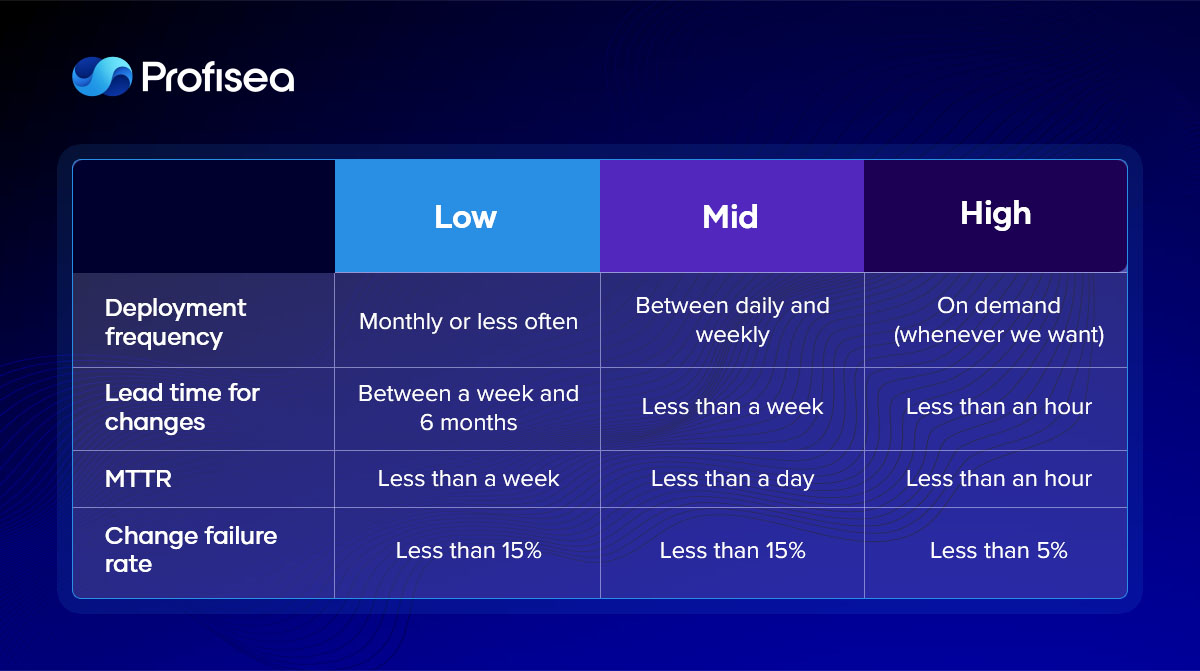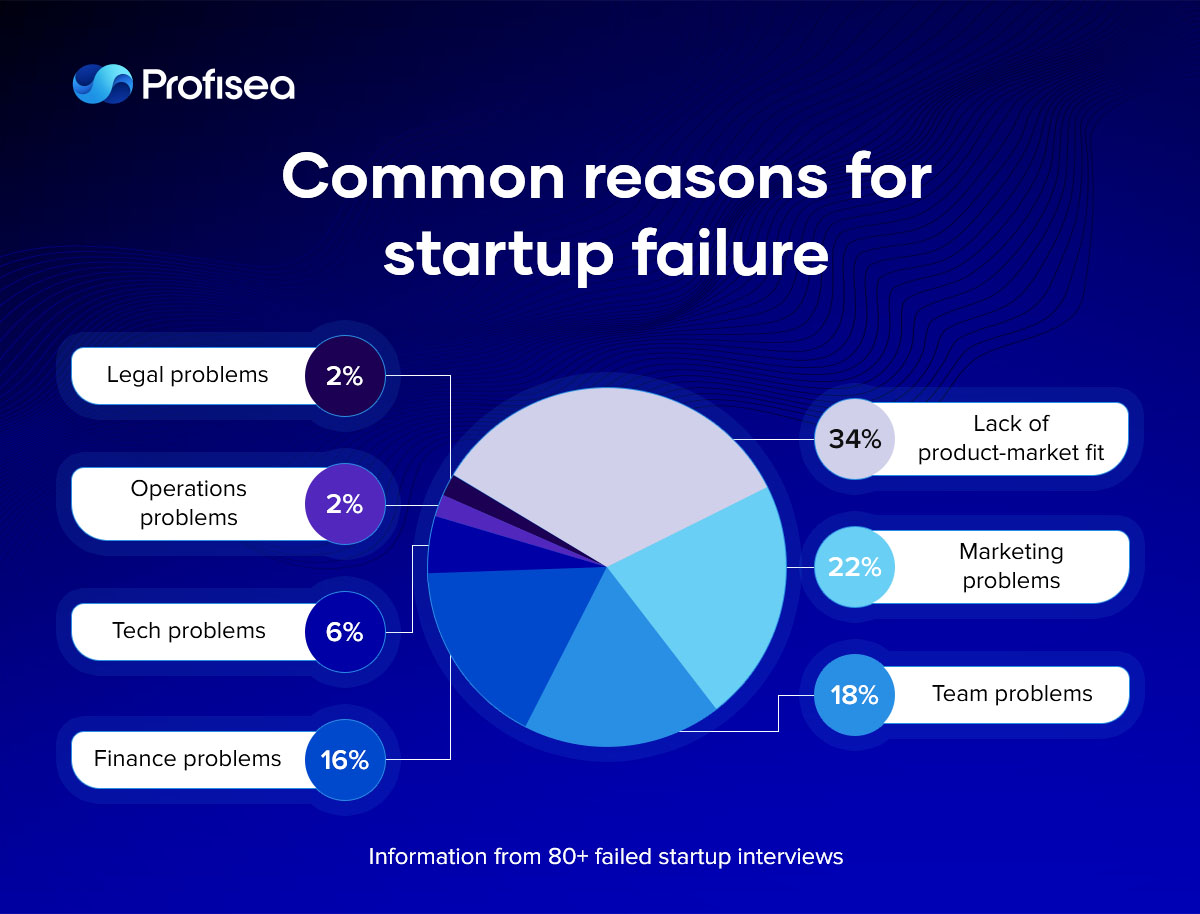7 Reasons DevOps helps startups succeed
Over the past 13 years, DevOps has become one of the most popular approaches in the IT community. According to GMI (Global Market Insights), the DevOps market’s size exceeded $7 billion in 2021 and is expected to grow at an average rate of over 20% per year from 2022 to 2028 to over $30 billion.
Why is DevOps celebrated? So many experts and so many explanations for DevOps they give, but you should know that DevOps is all about streamlining, automating, securing, and optimizing the software development process. And the primary outcome of this process should be high-quality products delivered as fast as possible.
We will discuss in this work why DevOps is necessary for startups so as not to let your startup replenish the ranks of abortive attempts. Since regularly quoted statistics, “9 out of 10 startups fail”, originating from the Startup Genome project, is unfortunately still valid.

What is DevOps?
Experts, as noted above, give many definitions of DevOps, so we decided to explain what DevOps means. DevOps helps IT companies grow with the transformation they go through by changing cultural norms and mindsets, bringing siloed teams into a single workflow. This transformation leadsIT organizations to better solutions, improvement, and unavoidable progress. DevOps is a combination of practices that promotes and reinforces an agile software delivery methodology, enabling companies to deliver high-quality products fast and securely, improve customers’ satisfaction and save money
According to the 2021 Google Cloud Accelerate State of DevOps report, teams identified as having “elite” DevOps performance showed (you can find how to determine between “high” and “low” DevOps performers in the tab below):
- x973 deployment speed compared to “low performance” data
- x6570 faster commit times for deployment compared to “low performance” data
- 3x lower change failure rate compared to “low performers” data
- x6570 server recovers more quickly from incidents of “low performers”

7 ways DevOps transforms business
The importance of DevOps for business cannot be underestimated. So let’s discuss how DevOps transforms business in detail.
1. Embracing a DevOps culture
DevOps is a set of practices designed to speed up the release of software products, reduce waste of time/resources, and improve the customer experience. But more importantly, DevOps is fundamentally focused on people, their attitudes, and the culture of their interactions. When team members develop system thinking, a DevOps culture begins to flourish. A DevOps culture eliminates the differences between IT teams’ roles. Teams pool their strengths, competencies, experience, and resources to work in sync throughout the entire DevOps cycle.
2. Automation-centred SDLC to increase time to market
The principles of DevOps are to increase the speed of software production, improve the quality of software, constant monitoring and feedback, and constant learning and experimentation. DevOps encourages the automation to SDLC (software development cycle), resulting in highly scaled environments and notable accelerated time to market via well-architected Continuous Integration, Continuous Delivery, and Continuous Deployment (CI/CD) pipelines.
3. Silos elimination: DevOps uplifts collaboration
One of the most critical ways DevOps is driving digital transformation is by championing the concept of “no silos.” By breaking down the silos, the development team better understands what happens next with the code, what kind of failures can occur, and fixes them faster. In addition, through constant collaboration and communication within teams, team members are more engaged, which significantly improves productivity.
4. DevOps improves business resilience and customers’ experience
IT companies grow quicker with more reliable and faster delivery of products and features. In addition, continuous and state-of-art monitoring means that failures are usually detected before the customer notices them or before they can compromise the entire business.
In addition, DevOps-based organizations are designed to respond quickly to new insights that may come directly from production, and they can evaluate functional experiments. As a result, an organization can conduct many experiments simultaneously, developing products, functions, and entire systems that will satisfy customers more.
5. DevOps upgrades security
DevOps has changed the way IT security is done. With the transition from long-planned deployments of monolithic applications to flexible development environments, security must be tightly integrated into development and operations processes.
DevOps Security or DevSecOps is a set of practices, cultures, and tools that integrate software development (Dev), IT operations (Ops), and security (Sec) to enhance an organization’s ability to deliver products quickly and securely via such steps:
- Adopt security policy as a code approach. Infrastructure as code replaces the traditional model of manual administration and configuration of servers/software by creating and managing security policy as code
- Integrate security into CI/CD pipelines. Too often, security is treated as an afterthought and is done too late in the process. Security-aware organizations take a proactive approach to security, implementing robust security practices throughout the lifecycle of an application
6. DevOps enhances agility and operational efficiency
DevOps agility is all about getting software and new features to market quickly. DevOps plays a critical role in improving operational efficiency and providing flexibility in the development and delivery process, enabling:
- Development teams promptly respond to business requirements and implement changes to applications
- Operations teams work diligently to keep systems healthy, secure computing environments, and manage cloud computing resources
7. DevOps saves costs and stimulates a revenue boost
DevOps is a business driving force because it improves SDLC agility and allows rapid product market release that boosts business profit. What about cost reduction? Everything revolves around automation. Whether that means you need a minor team to manage your infrastructure or dynamically scale your infrastructure up and down based on the amount of traffic, the bottom line here is that DevOps can help you save money. DevOps is a method for organizations to bring new products, features, and services to the market and to retrieve new scopes for future revenue streams.
Why startups need DevOps
A startup is a risky thing, and we all know why. Only 1 in 12 new business entrepreneurs succeed, says Startup Genome. And Failory, in its turn, names lack product-market fit and team problems as pivotal contributors to startups’ collapses.

Principles of the Lean Startup methodology solve the product-market fit problem. The key pillars are learning what your customers really want, testing your vision, and adjusting before it’s too late. The main idea here is to test your assumptions as quickly as possible and give yourself time to reverse them if necessary.
The Startup Genome claims that startups that make 1-2 pivots have x3.6 more users and raise x2.5 more money. Conversely, startups that turn 0 times perform significantly worse. With DevOps, you release faster, which means you get feedback quicker, so you can also pivot sooner if the feedback has been far from satisfactory.
If teams are your concern, DevOps addresses them effectively, and you already know how. Before using Agile methodology in the IT industry scene, the development and IT operations teams worked in separate departments and rarely collaborated and communicated closely on the same project. Since the introduction of the Agile methodology and the philosophy of DevOps, developers, QA specialists, and IT operations specialists have performed hand in hand in one lifecycle. As a result, the teams continuously improve the quality of their software and services and release them more frequently. It is then that the business not only survives but also thrives.
Why startups need DevOps consulting and DevOps as a Service
DevOps works when implemented correctly. Some companies build their DevOps team, which is excellent if you have a lot of time and other resources to invest in because you will need to hire DevOps engineers.
Another option is to grow your DevOps engineers. However, this method also requires a lot of time and energy because the learning curve for a DevOps engineer is quite long and complex. Therefore, building your DevOps team is too complicated and unnecessary for most IT companies, especially startups. With that, it is common for organizations to turn to mature DevOps companies that provide DevOps services to tackle their DevOps-related challenges, from deploying applications to designing and implementing cost-effective infrastructure in the cloud.
Final thoughts
Top-notch software development and fast-to-market software release are the main factors determining the IT business’s success. DevOps helps companies become more efficient and successful. Often, companies that think of adopting DevOps turn to the mature DevOps bosses, the companies that have been utilizing DevOps in practice for many years and provide DevOps as a Service.
Any startup starts with the idea that needs to be implemented. Great, successful things are not just happening. Suppose you want your startup to develop into a reliable and stable business. In that case, you’d better turn to mature professionals to provide the DevOps startup services we have listed above and help you achieve your goal.
If you have any DevOps/Cloud-related questions, drop us a message.




